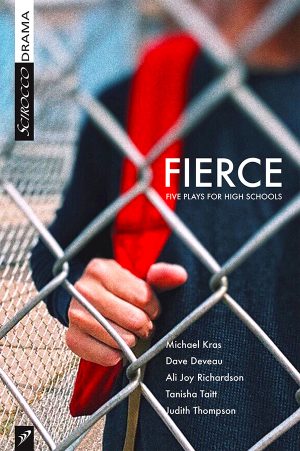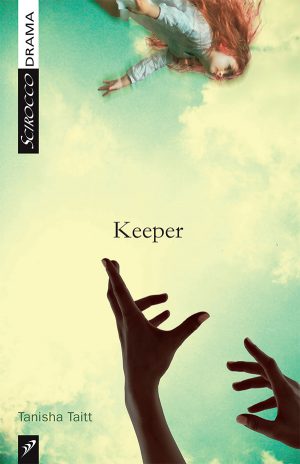Posted December 5, 2022
Class Notes – A Conversation with Tanisha Taitt and Professor Lisa Anne Ross
JGS Books had a lively conversation via Zoom with Professor Lisa Anne Ross of St. Thomas University in Fredericton, NB and Toronto playwright, director, musician, and educator Tanisha Taitt, who is currently the Artistic Director of Cahoots Theatre. Tanisha recently did a virtual classroom visit to Lisa’s students, who have been studying her play Keeper. The following is a transcript of our chat, edited for length:
JGS: Lisa, what course did you teach Keeper in?
Lisa: Actually, I taught Keeper in two courses; I teach Introduction to Theatre which is in the English Department at St. Thomas University in Fredericton, NB, and I also teach another course which is vaguely entitled “Performance Foundations” and that’s a second- or third-year course and that’s in the Fine Arts Department. And so Tanisha joined us in Introduction to Theatre, but I did ask students from both groups to purchase the book and we did a scene study in both classes.
JGS: Why did you choose Keeper?
Lisa: This is a long story…But during the lockdown, it’s not that I had an excess of time, but I did have time to do some of the deeper work, which you never have time to do during our regular artistic lives when we are just running from one fire or project to the next, and there’s never any breathing room, no reflection time. The pandemic gave me reflection time, and I came across a lecture that Tanisha gave. I think it was posted on the…
Tanisha: The Canadian Theatre Educators Conference site.
Lisa: That’s right! I think it was a colleague at Dalhousie university who sent me the link and said that I’d really enjoy this lecture, so I watched. And it really moved me. Basically, the lecture was a call to white theatre educators to bring more diversity into their classrooms in terms of the plays they were teaching, and to not be afraid to do that. More than that, it was their duty to do that. I was moved by that, and I felt that it gave me the permission that I needed to do that…There’s all these amazing lists out there right now, so I ordered a lot of new plays, and the following year I introduced a new segment in my class called “The Global Majority Scene Study.” It was very much inspired by Tanisha, and I gave an introduction to students about what we were doing, and I quoted you multiple times (Laughter.) and then I reached out to Tanisha and told her that she changed my teaching. I make light, but really, you did.
Last year we did Andrea Scott’s play Controlled Damage, which, luckily, had its world premiere at the Neptune Theatre just before the pandemic hit, and was a huge success. And the echoes of that continue. You might not hear all that news in Toronto but here, it’s created a real Desmond resurgence. Anyway, we had a chance to meet Andrea the same way that Tanisha and I met, through Zoom. Andrea Zoomed in to our class and the students got to ask questions about process and it was just amazing on a number of levels. Everyone was like, that was the best part of the class and we have to do it again.
So I thought maybe I should go to the source of this inspiration, and I had of course ordered Keeper and I really enjoy it. It’s a good contrast to Controlled Damage, which is a massive piece; what I loved about Keeper is that it is theatre at its best: a story about two people. Two people who are struggling and move through the conversation to find their way through it, or at least by the end we have an inkling that they will find their way through. And to be honest, it’s easier to teach first-years to analyze a play when there’s only two characters. And then I was lucky enough that when I asked Tanisha if she’d join us, she said yes!
JGS: Tanisha, what does it mean to you to have this particular play taught to students?
Tanisha: Oh my goodness. It’s so lovely! I didn’t know it was being taught in two classes until right now, so that’s a good thing! That’s really nice. My first experience of it was at George Brown [Theatre School] and I didn’t know, actually. I had heard through the grapevine that some students were reading it, and I thought, “Oh, that’s cool.” But then I went to see a first-year scene study presentation and I sat down and scenes started happening—and then suddenly there were two first-year students saying my words. I had no idea that it was in the presentation, and that was very surreal—but lovely, very very lovely. But to be reached out to by Lisa and to learn that there were people reading it outside of Toronto…It was really nice to think that not only was somebody in the Atlantic provinces aware of it but had been impacted by it enough that they wanted to share it with their students; that was very touching.
JGS: I did want to ask a bit more about Tanisha’s visit. What were some of the aspects that the students were interested in talking about? And also, what were the highlights of that visit for each of you?
Lisa: I just finished marking… I’m not super-interested in marking, as a theatre artist I’m interested in creating artists and engaging my students in bigger ideas and having a conversation about what does it mean to be an artist in the world. But you have to give them assignments, too, so they did an analysis of Keeper. And I was really excited by what the students wrote and how much they connected with the characters, how much they were drawn in by the story. I always ask them about the stakes for the characters…students tend to think of this as, you know, are the characters falling out of an airplane or are they on fire, but this play really helped them to see that emotional stakes are fire. I was really excited to read that the students really connected with that.
They loved it; they loved the play and they loved meeting you. We had so many conversations about it. And not just learning about the play and your process…This is a small province; many students come from small towns around the Maritimes, some are first-generation university students, a lot of firsts. They may never have met a professional theatre artist before, let alone someone who has created this amazing career in Toronto, right, where you’re doing so many different things—you’re a playwright, you’re a director, you’re an educator. For them to see that, it really resonated. “This is real; this can be real.” And we have a handful of students who identify as people of colour, and for those Black students and the Latinx students, this is extra-extra special. This is a small community; there are not a lot of professional artists of colour working here; they just don’t get to see themselves reflected in professional theatre, generally.(Although it’s changing.)
Tanisha: I loved meeting the students. I thought that they were so keen, and they asked really cool questions. It’s so nice to have interactions with students who are genuinely interested. (Laughter.) Sometimes it can feel like pulling teeth! But they were really into the play and they had really cool questions, and I was struck by the level of genuine engagement there was. I love students; I just love students in general, they’re so much less irritating than everyone else in this industry.
Lisa: I know, I love teaching for that reason, right? It’s about the work; everything is so new and exciting. They’re not jaded.
Tanisha: They’re not jaded. I’ve done a lot of work with young people in a lot of different settings, but there’s something about working with people who have made the conscious decision to make theatre their life that is different. It’s just different from teaching in a program their parents have put them in, or something they’re just doing for a summer…This is people who have left high school and said, “This is what I want.” And there’s a focus and a passion that is palpable, and I love it.
JGS: Thanks so much to both of you for this.
Tanisha: Thank you.
Lisa: Thank you, and thank you, Tanisha, for your generosity with the students. It really did have a lasting impact on them.
Tanisha: Thank you for asking me. It was a really nice surprise to get an email from a teacher across the country asking me to do that.
-
 Fierce: Five Plays for High Schools$9.99 – $24.95
Fierce: Five Plays for High Schools$9.99 – $24.95 -
 Keeper$9.99 – $15.95
Keeper$9.99 – $15.95
